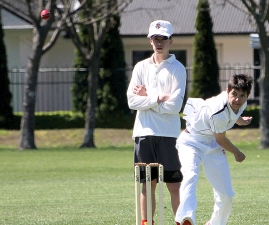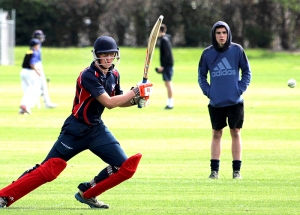Search

 Photo Doug BovettSending a ball down the pitch during the Ashburton College Combined 2nd XI’s game against the St Bede’s 4th XI at St Bede’s on Saturday was Cade Whittaker.
Photo Doug BovettSending a ball down the pitch during the Ashburton College Combined 2nd XI’s game against the St Bede’s 4th XI at St Bede’s on Saturday was Cade Whittaker.
Ashburton College won the game by eight wickets, a win which was set up by them bowling St Bede’s out for just 47 after the home side won the toss and elected to bat first.
Ashburton College Combined captain Adam Shears was the best of the bowlers taking 3/6, while Millar Newlands took 3/11 and Liam Fuller 2/4.
Their side then reached the target for the loss of just two wickets, with Gus Casey-Solly scoring 15 and Shears finishing 12 not out.
© The Ashburton Guardian - 24 October 2019
Ashburton College teacher Trevor Cochrane came within 0.56 seconds of a Commonwealth Games bronze medal in 1974 and still remembers his Games experience like it was yesterday. Erin Tasker reports.
For Trevor Cochrane it seems like just yesterday that he lined up in the starting blocks for a shot at Commonwealth glory, wearing the Silver Fern proudly on his chest.
In reality, it was 40 years ago.
Forty years may have passed since the 1974 Christchurch Commonwealth Games, but for short-distance sprinter Trevor, the memories of those 10 days are still fresh. He remembers narrowly missing out on a bronze medal and watching Dick Tayler shock everyone by coming from behind to win gold.
Thirty-eight countries and 1276 athletes were competing for Commonwealth glory, but it was Tayler’s heroic feats on day one that captured the hearts and minds of a nation and his fellow athletes.
“I can remember having a tear in my eye and it still brings a tear to my eye thinking about it today, watching the last 300 metres,” Trevor said.
“He was not expected to be anywhere near the medals and in the early stages of the race he was back probably 60 or 70 metres I’m guessing, so he was back there and up the front was the world record holder David Bedford and another Englishman, and there were three Kenyans. The three Kenyans set out to disrupt Bedford because they saw him as the likely winner.
“One went in front, one went beside him and one went behind him and they just kept altering the pace and breaking (Bedford’s) rhythm and they broke him. And here’s Tayler out the back, out of trouble, running his own race.
“Then gradually he closed in on the field and by this stage Bedford was gone and the race carried on and, with 300 metres to go, there were only two guys in the race, David Black from England and Dick. Dick was sitting right on Black’s shoulder and Dick kicked and took off and Black couldn’t catch him.”
After that stunning win, the Games were over for Tayler; his job was done.
But for Trevor, he had to remain focused because he was competing in four events – the 100 metres, the 200 metres, the 4×100 metre relay and the 4×400 metre relay.
In 1974, the 100m was Trevor’s main event. He held the Canterbury record and was a specialist 100m and 200m sprinter.
“The year after the Games I moved up to the 400m and a year or two after that I moved up to the 800m.”
A back problem was giving him some grief and not long after that he was given two options by his surgeon – have an operation to have his spine fused or retire. Trevor chose to retire.
“If I was a world beater I might have thought differently,” he said.
His best time for the 100 metres remains 10.5 seconds. At the time he ran that, the New Zealand record was just 10.4 seconds. Forty years later the world record held by Jamaica’s Usain Bolt is 9.58 seconds.
The 100m at the 1974 Games was won by another Jamaican, Don Quarrie. Quarrie was in Trevor’s heat at the Games and was the time’s 100m Olympic champion and world-record holder for the 200 metres.
His winning time for Commonwealth gold in Christchurch was 10.3 seconds.
Trevor said he “didn’t do particularly well” in the individual events at the Games, but was part of some formidable relay teams.
His 4x400m relay team finished fifth – missing out on bronze by just 0.56 of a second – and the 4x100m relay team was sixth. They set New Zealand records in both relays, both of which stood until 1990.
Many of the top athletes who had arrived early took part in a warm-up event to the Commonwealth Games, held in Ashburton. That was a big deal for the town.
“I had the privilege of running against John Mawibi (Kenya), the winner of the silver medal in the actual Games’ 100m. I won that race,” Trevor said.
He also competed against Kenya’s Charles Asati in the 400m. He was the current Olympic champion.
It was all part of a whirlwind month or two for the boy from Ashburton. His selection came just the month before, at December’s national championships.
“From that they picked the Commonwealth Games team so you had to perform well at that event,” Trevor said.
And he did.
“I think I ran second in the 100m behind the bronze medal winner of the 200m at the Games,” he said.
That was Bevan Smith.
“Unfortunately I was in the same era as Bevan, so I was always the bridesmaid.”
Trevor was living in Christchurch at the time, studying at teachers’ college. Looking back he thinks the fact he lived in the city helped him gain selection.
“If I didn’t go to Christchurch I ask myself the question ‘would I have made the Commonwealth Games and I’m pretty sure the answer is ‘no’,” he said. You really had to be in a main centre to get noticed back then, he said. But these days there are scouts everywhere looking for talented youngsters.
In Mid Canterbury, cycling was a prime example of that. As a region we seem to be constantly turning out world beaters on the bike without them having to go elsewhere to get noticed, Trevor said.
But however it happened, he’s happy he got to experience the Commonwealth Games, even if it was in his own backyard.
The fact that the Commonwealth Games were in New Zealand – meaning more athletes attended and competed – could have helped Trevor make the team.
He’s not fussed that his Commonwealth Games experience happened on home turf. He might not have got to travel overseas for it, but he had the benefit of having a stadium full of people cheering for him when he took to the track. For that 10 days, he knew what it was like to be an All Black.
His family attended; supporters from Athletics Canterbury and his club – High School Old Boys – were there to support him. Tickets weren’t as expensive back then and it wasn’t until Dick Tayler’s gold medal win that the seats really started filling. “On the first day of the Games when I competed in the 100m I would say the stand was only a third full.
In the afternoon of that day Dick Tayler won the 10,000m and by that stage the stand was probably three quarters full because it was late in the day and the 10,000m was a premier event.
Tayler alone was responsible for a fair amount of the Christchurch Games’ success, Trevor said.
The Christchurch Games were vastly different from today’s Games. They were a roaring success, but nowhere near as spectacular and glamorous as today’s.
“The opening ceremony, personally I think we have lost something with opening ceremonies in major sports events now because they have become the focus as people try to out-do each other,” Trevor said.
“The focus is now about the razzle dazzle and taking the focus off the athletes.”
Trevor said in 1974 the budget for the entire Games was $10 million. Now big sporting events can spend 10 times that on the opening and closing ceremonies alone.
Christchurch’s wasn’t flashy, but it was good.
“The Queen and Duke were there and all the teams marched in and there were a few speeches and a little bit of entertainment, but nothing major, and it was all over,” Trevor said.
“Part of the razzle dazzle bit is to do with there is so much televised sport today. Every day you can go to Sky Sport and there’s something live happening around the world so people become quite blasé about the whole thing.”
In 1976, Trevor moved back to his hometown of Ashburton to take up a job as a physical education teacher at Ashburton College – his old school. He planned to stay there for two years, but 38 years later he’s still there.
Ashburton – for him – was a great place to settle down and have a family. He and wife Jan have two grown children – Charlotte and James.
In Ashburton he also shifted his focus to coaching and proudly claims to having coached more than 10 athletes to national titles, and in 1987 was selected as coach for the New Zealand Secondary Schools’ athletics team.
High jumper Steve Hollings was the closest he came to coaching an athlete to reach the Commonwealth Games.
“Steve still holds the Ashburton College high jump record of 2.05m. One year he was the New Zealand secondary schools, under-18, junior men’s and senior men’s high jump champion and went to the junior world championships.”
Trevor himself still holds four Ashburton College athletics records. There were more, but he reckons about half of them have since been broken.
He holds the senior boys 100m record of 11.3 – which he shares with Keith Plunket who set it in 1943 and Ian Watson (Trevor’s brother-in-law) who equalled the mark again in 1979. He also holds the senior boys’ 200m and long jump records, and the under-16 boys’ triple jump.
Holding such long-standing records is special, but nothing can beat representing your country at an event like the Commonwealth Games.
“It’s been the highlight of my sporting life and it’s opened doors for me, I’m sure.”
By Erin Tasker © The Ashburton Guardian - 27 January 2014 (posted 16 October 2019 AshColl Alumni)
 Ben Middleton watches the progress of one of his shots during the Ashburton College first XI’s first game of the season on Saturday. Photo Doug BovettAshburton College’s 1st XI didn’t get their season off to the best of starts in Christchurch on Saturday, in round one of the Canterbury Youth 1st XI grade’s one day cricket championship.
Ben Middleton watches the progress of one of his shots during the Ashburton College first XI’s first game of the season on Saturday. Photo Doug BovettAshburton College’s 1st XI didn’t get their season off to the best of starts in Christchurch on Saturday, in round one of the Canterbury Youth 1st XI grade’s one day cricket championship.
The Ashburton boys headed to Christchurch to play the Christchurch Boys’ High School (CBHS) 1st XI, which is never an easy ask, and came home with an eight wicket loss to their names.
Batting first, runs were hard to come by and wickets fell regularly, and by the end of their 40 overs the Ashburton side had amassed 90/8.
Jonty Small was the side’s top runs scorer with 23 before he was trapped leg before off the bowling of Tom Sutherland, while Isaac Bazley was the next best on the board with 17.
Angus Jemmett and Will Copland were the only others to make double figures, each making 10.
Sutherland, Regan Sheahan and Curtis Millard all finished with two wickets each for CBHS.
Ashburton College did deliver an early blow to CBHS’s runs chase, with opener Stanley Ashwin caught by Lachie Jemmett off the bowling of Angus Spittal for just one.
But from 4/1, it was relatively smooth sailing for CBHS.
They lost the wicket of Mackenzie Smith for 35 with the score on 67, but opener Sutherland saw his side home, finishing 31 not out.
CBHS got through to 91/2 off just 19.3 overs, and the other unbeaten batsman for CBHS was Methven’s Archie Redfern on 12 not out.
Redfern and fellow Mid Cantabrian Harry McMillan have already been making names for themselves this season, with both making a recent Canterbury Invitational XI.
In the next round of the Canterbury Youth 1st XI grade one day competition, Ashburton College will play host to the St Bede’s 1st XI, a side that also picked up a good win on Saturday, downing the North West Cricket 1st XI by 55 runs.
Ashburton College’s game against St Bede’s will get under way at 10.30am this Saturday at the Ashburton Domain.
By Erin Tasker © The Ashburton Guardian - 16 October 2019


